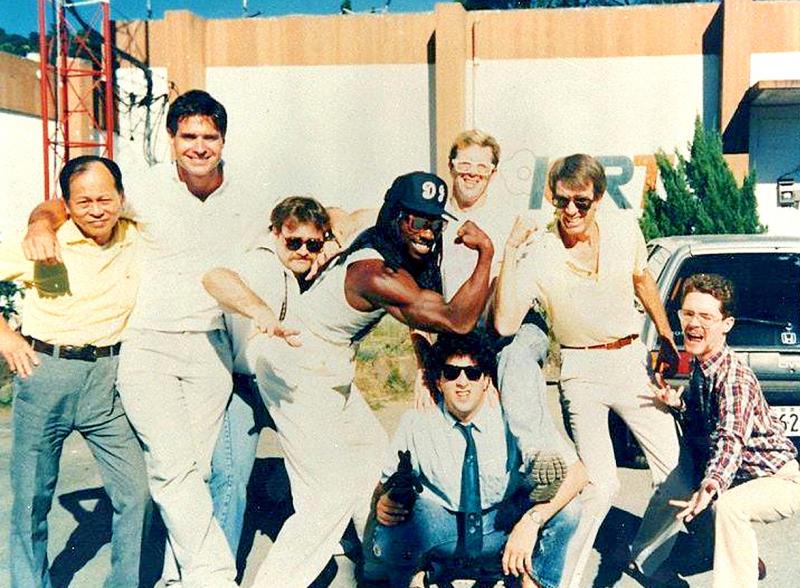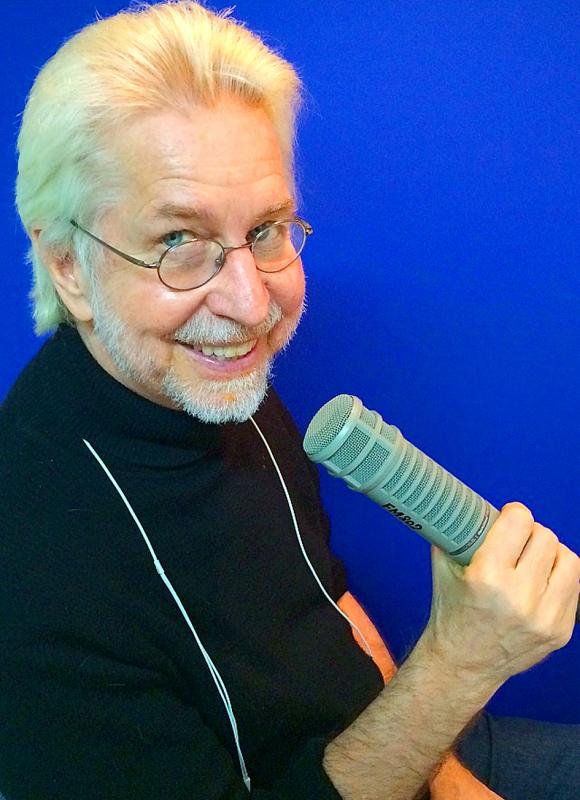After the deaths of several beloved International Community Radio Taipei (ICRT) personalities over the past several years, former DJ Rick Monday wanted to do something to preserve in time the station’s golden days when “radio was king.”
“We couldn’t let any more people go without [recording their memories],” Monday says. “But we didn’t just want to sit there and talk about them. We wanted their voices. So we started reaching out to former employees, and we got 17.”
Most importantly, Monday got in touch with former general manager Craig Quick, who took over the station in 1983 and is now in his 80s.

Photo courtesy of Radioactive Taiwan
“It was his vision,” Monday says. “None of us came here and said we were going to make Taiwan a better place; we all stepped into Craig’s vision.”
These testimonials, along with recollections from 10 former listeners, eventually morphed into Radioactive Taiwan, a five-episode podcast discussing the groundbreaking English-language station’s impact on Taiwanese society during the 1980s and 1990s. The show is narrated by iconic former DJ Bobby Kong, who now lives in Tokyo, and produced by former host Gray Gleason out of Manila.
“ICRT was social media,” Kong tells the Taipei Times. “People who spoke English listened to ICRT to get the latest music and gossip, and for Chinese listeners it was a place where they could hear native English speakers outside of the buxibans. They could call in, talk to DJs and make requests in a new, unique American style that was different from what was being broadcast in Taiwan.”

Photo courtesy of Rick Monday
The retro-sounding series covers much ground, from the station serving as a gateway to Western culture, to reporting on sensitive news topics during martial law, to its role as an active community partner. Among other items, ICRT organized one of Taiwan’s earliest singing contests, helped Coca Cola break into the local market through musical activities and reportedly pulled off one of the largest Fourth of July bashes in Asia at that time.
“We were by far a lot more than just a radio station,” Monday says. “That’s why it’s called Radioactive.”
To set a solid deadline, the team aimed to complete the project in time for The People’s Choice Podcast Awards, which is accepting votes until the end of the month.

Photo courtesy of Bobby Kong
COLLECTING MEMORIES
Monday launched the project about a year ago, starting by contacting former co-workers with the help of former news reporter and marketing manager Nicholas Gould.
“We tried to remember what department those people were in,” he says. “ICRT had over 150 employees then.”
It wasn’t easy to get them to talk at first: “A lot of people said, ‘Rick, you still live in Taiwan, you still listen to ICRT and it’s easy for you to remember. Think about me, I left and started another career … I’m a father and grandfather now.’”
They were more receptive when asked for memories working for Quick, who upgraded and expanded ICRT from a small community station into a state of the art, full-blown American-style operation. He also helped combat pirating in Taiwan by licensing Western pop hits and shows such as American Top 40.
“People were like, ‘I still know in my heart why I worked for Craig,’” Monday says. “He just came in and got everything established. I worked in radio in the US and when I came here and heard about what he wanted to do, I said, ‘hell yeah.’”
Kong was reluctant to narrate the show at first since he had been away from ICRT for so long, but Monday insisted that “everyone knew his voice.” He worked closely on the script with Monday and Gleason.
“This is a tribute to Gray’s sound engineering and Bobby’s narration,” Monday says. “I was just kind of the secretary.”
Things moved slowly for about a year, but Monday says he decided to ramp things up after former host and Taipei Times deputy chief copy editor Diane Baker died in January. She had agreed to record her bit for the podcast just four days before her death.
“We had to finish it and get it out for people to listen to,” he says. “I said, I’m going to push the last of y’all who said you were going to do it but haven’t. Damn it, just do it, because none of us know how much time we have left on earth.”
HIT EVENTS
Although ICRT stood out in those Martial Law-era days for its relatively unrestricted newscast — it was the first to host a Democratic Progressive Party politician — Monday says he had a hard time getting news staff on the podcast. As a result, the podcast focuses more on the station as a voice of American soft power and how it was immensely popular among students who wanted something different in a society that was opening up after decades of authoritarian rule and censorship.
Monday says his top four off-air events were promoting the 1987 Cutting Crew show and the 1990 BB King and Ray Charles concert (where they had to instruct the audience to applaud after each song), the wildly successful 1989 American Chamber of Commerce Fourth of July bash and the Young Stars university singing contest.
Members of Cutting Crew and the immensely popular Air Supply share their memories of playing in Taipei on the podcast.
Kong says he adopted the singing contest from a popular venture he did with high school students in Hawaii, and it became quite successful with big-name sponsors, record deals and scholarships. The scale was unprecedented as they held preliminaries in over 100 universities, giving a chance to a much wider range of hopefuls.
One of Kong’s fondest memories of interacting with the audience was the “Xiaofan Yelling Contest,” where people called in and gave their best rendition of street vendors hawking their wares for prizes.
“I sent the podcasts to my brother, and he said, ‘I knew you were in Taiwan to do radio, but I had no idea you were doing so many interesting things,” Kong says.
With traditional media in decline due to the Internet, the show provides fascinating insight to what a radio station could do back then. “We want to give a shout out to [current general manager] Tim Berge for keeping ICRT alive; it’s tough,” Monday says.

Cheng Ching-hsiang (鄭青祥) turned a small triangle of concrete jammed between two old shops into a cool little bar called 9dimension. In front of the shop, a steampunk-like structure was welded by himself to serve as a booth where he prepares cocktails. “Yancheng used to be just old people,” he says, “but now young people are coming and creating the New Yancheng.” Around the corner, Yu Hsiu-jao (饒毓琇), opened Tiny Cafe. True to its name, it is the size of a cupboard and serves cold-brewed coffee. “Small shops are so special and have personality,” she says, “people come to Yancheng to find such treasures.” She

Late last month Philippines Foreign Affairs Secretary Theresa Lazaro told the Philippine Senate that the nation has sufficient funds to evacuate the nearly 170,000 Filipino residents in Taiwan, 84 percent of whom are migrant workers, in the event of war. Agencies have been exploring evacuation scenarios since early this year, she said. She also observed that since the Philippines has only limited ships, the government is consulting security agencies for alternatives. Filipinos are a distant third in overall migrant worker population. Indonesia has over 248,000 workers, followed by roughly 240,000 Vietnamese. It should be noted that there are another 170,000

Hannah Liao (廖宸萱) recalls the harassment she experienced on dating apps, an experience that left her frightened and disgusted. “I’ve tried some voice-based dating apps,” the 30-year-old says. “Right away, some guys would say things like, ‘Wanna talk dirty?’ or ‘Wanna suck my d**k?’” she says. Liao’s story is not unique. Ministry of Health and Welfare statistics show a more than 50 percent rise in sexual assault cases related to online encounters over the past five years. In 2023 alone, women comprised 7,698 of the 9,413 reported victims. Faced with a dating landscape that can feel more predatory than promising, many in

Former Chinese Nationalist Party (KMT) chairwoman Hung Hsiu-chu’s (洪秀柱) attendance at the Chinese Communist Party’s (CPP) “Chinese People’s War of Resistance Against Japanese Aggression and the World Anti-Fascist War” parade in Beijing is infuriating, embarrassing and insulting to nearly everyone in Taiwan, and Taiwan’s friends and allies. She is also ripping off bandages and pouring salt into old wounds. In the process she managed to tie both the KMT and the Democratic Progressive Party (DPP) into uncomfortable knots. The KMT continues to honor their heroic fighters, who defended China against the invading Japanese Empire, which inflicted unimaginable horrors on the